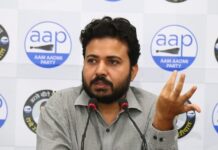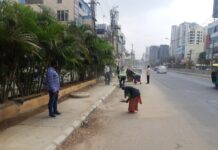
Kolkata, Veteran parliamentarian Somnath Chatterjee, the first Communist Speaker of the Lok Sabha who had defied his party’s call to quit the post, died here on Monday following a cardiac arrest and prolonged old age-related illness.
Chatterjee was given a 21 gun salute in the West Bengal Assembly, while the nation mourned the death of the barrister-turned-politician, known for championing the cause of the downtrodden.
Chatterjee, 89, leaves behind his wife, a daughter and a son.
“He died at 8.15 a.m,” Bellevue Clinic CEO Pradip Tondon told IANS.
Ailing for a long time, Chatterjee’s condition turned grave on Sunday after he suffered a heart attack. On August 7, he had been admitted to the clinic in a critical condition due to a kidney-related ailment and put on ventilator support.
A former Communist Party of India-Marxist (CPI-M) central committee member, Chatterjee was Lok Sabha Speaker during the first United Progressive Alliance (UPA-1) rule from 2004 to 2009.
It was during this stint that direct telecast of the Zero Hour started in 2004, while the Lok Sabha television channel came into existence in 2006.
However, on July 23, 2008, Chatterjee was expelled from the Communist Party of India-Marxist “for seriously compromising the position of the party” as he refused to resign as the Speaker after the CPI-M withdrew its support to the UPA-1 government over the Indo-US civil nuclear deal.
Chatterjee had then contended that the office of the Speaker was above party affiliations and he ceased to be a CPI-M member once he took over the job.
Till the end, Chatterjee had nursed a deep sadness over his expulsion.
In Kolkata, as the news of Chatterjee’s death became public, West Bengal Chief Minister Mamata Banerjee rushed to the private clinic and paid her last respects.
From the clinic, the cortege was taken to the Calcutta High Court, where Chatterjee had started his legal practice in the early 1960s. Judges, lawyers and clerks all came out of the corridors of the court to pay homage to him.
The next stop was the Assembly, where the body was placed on a high platform by police personnel in a slow march. The bugle played the last post before he was accorded a guard of honour and gun salute.
Banerjee was present at both stops, and even walked barefoot from the high court to the Assembly.
The cortege was then carried to Chatterjee’s house in south Kolkata, where his wife Renu and other family members wept inconsolably. Lok Sabha Speaker Sumitra Mahajan, who flew here from Delhi, garlanded the corpse at the house.
Sometime after evening, the body was donated to the SSKM Hospital, in deference to Chatterjee’s wish that his mortal remains be used for medical causes.
President Ram Nath Kovind and Prime Minister Narendra Modi led the nation in paying glowing tributes to Chatterjee.
Calling him “a veteran parliamentarian who had a forceful presence in the House”, the President tweeted: “A loss for public life in Bengal and India. My condolences to his family and innumerable well-wishers.”
Modi described Chatterjee as a stalwart of Indian politics who made parliamentary democracy richer.
Congress President Rahul Gandhi hailed him as “an institution”.
Banerjee termed it a great loss.
Nationalist Congress Party (NCP) President Sharad Pawar described Chatterjee as “a dignified person who set high standards of conduct during his stint as Lok Sabha Speaker”.
Governors, Chief Ministers and politicians across the country grieved for Chatterjee.
CPI-M General Secretary Sitaram Yechury “deeply mourned” for Chatterjee, and later airdashed to his residence to garland the body.
Chatterjee joined the CPI-M in 1968, and was elected to the Lok Sabha for the first time in 1971 from Burdwan constituency in a by-election as an Independent candidate backed by the CPI-M.
The seat had fallen vacant after the death of his father Nirmal Chandra Chatterjee, a Hindu revivalist and one of the founders and one-time President of the Akhil Bharatiya Hindu Mahasabha.
He made it to the Lok Sabha on CPI-M ticket from Jadavpur in 1977 and 1980, but lost to Mamata Banerjee — the present West Bengal Chief Minister and then a Youth Congress leader — in 1984.
However, the very next year, he re-entered the Lok Sabha after the party nominated him as its candidate from Bolpur in a by-election. He retained the seat in 1989, 1991, 1996, 1998, 1999 and 2004. From 1989 till 2004, he served as the Leader of the CPI-M in Lok Sabha.
During his three decades in the opposition benches of the Lok Sabha, Chatterjee used his baritone, legal skills and debating prowess adroitly to pin the government on the mat on a plethora of issues, and was given the “Outstanding Parliamentarian Award” in 1996.
Born on July 25, 1929 in Tezpur in Assam, Chatterjee studied in Kolkata, before earning B.A and M.A degrees in Law from the Jesus College, Cambridge. He was called to the bar from London’s Middle Temple.
Chatterjee was a close confidant of former West Bengal Chief Minister Jyoti Basu, who made him Chairman of the West Bengal Industrial Development Corporation (WBIDC).
Working with all sincerity, Chatterjee toured various countries, inking memorandums of understanding worth thousands of crores, but very few of the pacts materialised as industrial projects on the ground.
A keen sports enthusiast, Chatterjee headed the West Bengal Table Tennis Association for four years, till he stepped down in May citing his poor health.
He was an ardent supporter of city soccer giants Mohun Bagan.








